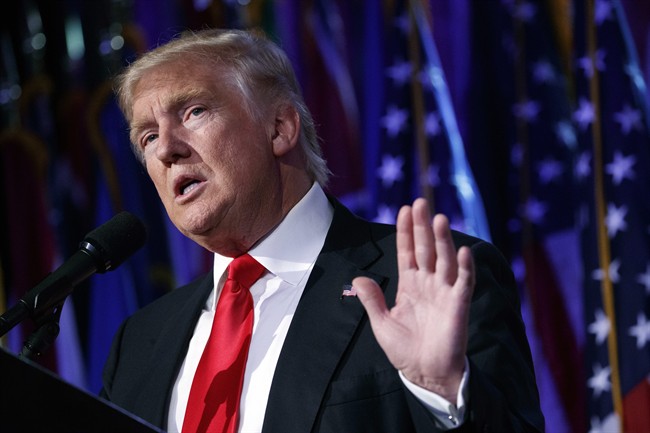As if to punctuate just how trying 2016 has been for politics, Oxford Dictionaries has made a political statement with its choice for word of the year.

“Post-truth” – an adjective defined as “relating to, or denoting circumstances in which objective facts are less influential in shaping public opinion than appeals to emotion and personal belief” – has been selected by the dictionary’s editors as the defining word of 2016.
READ MORE: The death of truth and the U.S. Presidential Election
The word was selected thanks to a spike in use related to the Brexit vote in the United Kingdom and the U.S. presidential election. Oxford Dictionaries said that use of the term rose 2,000 per cent between 2015 and 2016.
But Oxford Dictionaries said the term “post-truth politics” specifically captured their interest – a term that became widely used by pundits and media organizations when covering Donald Trump’s presidential campaign.
The Economist, for example, described Trump as the “leading exponent” of post-truth politics, “a reliance on assertions that “feel true” but have no basis in fact.” An example of this would be when Trump accused President Barack Obama of establishing the Islamic State group.
“Post-truth has gone from being a peripheral term to being a mainstay in political commentary,” read Oxford Dictionaries post announcing the Word of the Year.
“The term has moved from being relatively new to being widely understood in the course of a year — demonstrating its impact on the national and international consciousness.”
READ MORE: Fact check – Donald Trump resurfaces debunked claims in RNC speech
The new Word of the Year has been met with mixed reaction on social media; though many people seemed relieved that Oxford Dictionaries had returned to words, instead of emoji. Last year, the dictionary declared the “Face with Tears of Joy” emoji was the word of the year, much to the disappointment of language experts.
READ MORE: Don’t worry, experts say, emoji being crowned ‘Word of the Year’ isn’t the end of language
But post-truth wasn’t the only political term to capture the interest of dictionary editors this year. Included on the shortlist for Word of the Year was, “alt-right,” an ideology associated with extreme conservative viewpoints; “glass cliff,” used in reference to a woman or member of a minority rising to a place of leadership in challenging circumstances; and “Brexiteer,” a person in favour of the U.K. leaving the European Union.
That being said “adulting,” the practice of behaving like a responsible adult, and “coulrophobia,” irrational fear of clowns, also made the short list.
(Though an irrational fear of clowns may have been warranted after a spike in creepy clown sightings over the last few months.)
- Toronto’s offices are emptying out. The city wants to know what to do with them
- Capital gains changes could have ‘irreversible’ effects, business groups warn
- Could notwithstanding clause be used on abortion? Poilievre’s office says ‘never’
- U.K. takes aim at allies like Canada, wants higher NATO targets




Comments